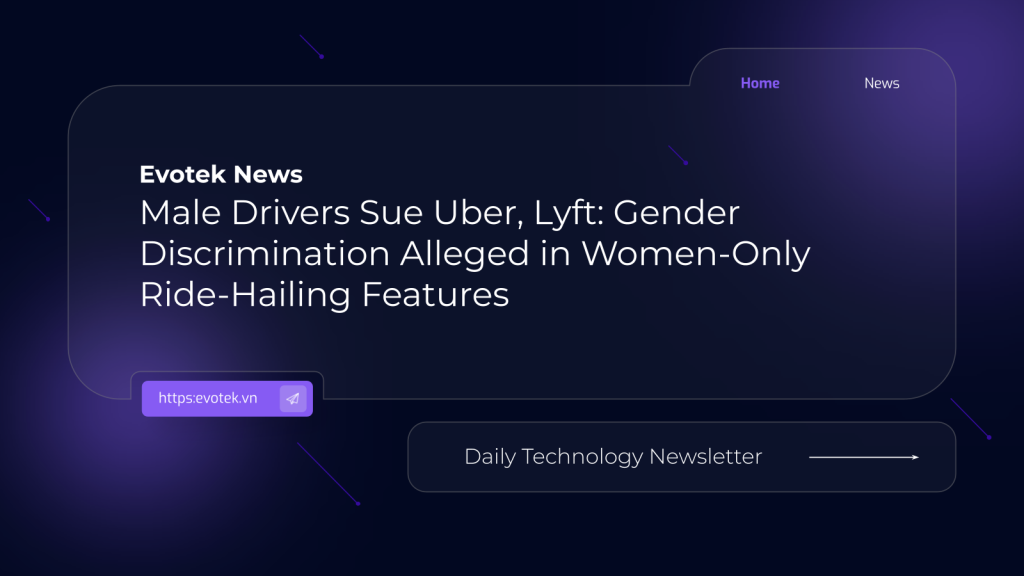Uber and Lyft are facing significant legal challenges as male drivers file class-action lawsuits, alleging sex discrimination over the companies’ women-only ride-hailing features. These lawsuits contend that such options unfairly limit economic opportunities for men and perpetuate harmful gender stereotypes, igniting a complex debate between civil rights and passenger safety.
The Core of the Discrimination Claims
The dual class-action lawsuits, brought by male drivers for both ride-hailing giants, target features designed to match women riders with women drivers. Lawyers representing the plaintiffs argue that these policies lead to male drivers receiving “fewer and different rides” than they would otherwise, absent the gender-specific options. They further assert that these features “reinforce the gender stereotype that men are more dangerous than women.”
The legal challenge is particularly potent in California, known for its robust anti-discrimination legislation. Both Uber and Lyft are accused of violating the state’s Unruh Act, a civil rights law explicitly prohibiting sex discrimination by businesses. The plaintiffs are seeking substantial damages, with demands for $4,000 per male driver in California for these alleged state law violations. While only two drivers are named as plaintiffs in each case, the lawsuits estimate that hundreds of thousands of male ride-sharing drivers across California could be covered by the class action.
Safety Concerns vs. Discrimination Allegations
The lawsuits have met with strong reactions, particularly from users who depend on these women-only features for their safety and comfort. Celeste Juarez, a 28-year-old user, expressed dismay, stating, “I just feel more safe and comfortable with a woman driver.” Juarez, who frequently uses Uber’s Women Preferences option, recounted multiple “uncomfortable experiences with male drivers” and views the lawsuits as “misguided.” She emphasized that for women, these options are crucial for feeling safe and avoiding “unwanted sexual advances,” especially when returning home late.
Both Uber and Lyft have publicly stated that these features were introduced in response to high demand from women riders and drivers. Uber launched its program allowing female drivers and passengers to match with other women in July, subsequently expanding it to major U.S. cities like San Francisco, Los Angeles, and Detroit. Lyft’s “Women+ Connect” program, rolled out in 2023, extends its inclusive matching to women and nonbinary individuals, with initial availability in cities including Chicago, Phoenix, and San Francisco. Several nonprofit organizations, including the Human Rights Campaign, have voiced support for Lyft’s initiative, highlighting its commitment to inclusion.
A History of Safety Issues in Ride-Hailing
The introduction of these gender-specific features is not without precedent, emerging against a backdrop of ongoing safety concerns within the ride-hailing industry. Uber’s most recent U.S. Safety Report (2021-2022) documented 2,717 reports of serious sexual assault or misconduct, with drivers accused in 92% of these incidents. Women were disproportionately affected, representing 89% of survivors in cases of non-consensual penetration.
Lyft’s own reports have detailed similar alarming figures, with over 1,800 sexual assault reports in 2019 alone, and more than 4,000 reports between 2017 and 2019. Beyond sexual assaults, labor groups have also raised alarms about driver safety, with reports indicating 50 drivers killed on the job from 2017 to 2022. In a related development, U.S. District Judge Charles Breyer, overseeing over 2,300 sexual assault lawsuits against Uber, previously indicated that the absence of a gender-matching feature on the app could potentially lead to liability claims.
The Broader “Culture War” Implications
The debate surrounding these women-only features has quickly permeated a wider “culture war” discourse. Conservative groups, notably the Heritage Foundation, have criticized these programs. A commentary from the think tank argued that such preference models violate sex discrimination laws, drawing parallels to historical racial discrimination by taxi drivers. Similarly, alt-right personalities have publicly denounced Lyft’s Women+ Connect program. Despite the backlash, Uber and Lyft continue to maintain that the programs are “highly requested” and are central to enhancing safety for women and non-binary users on their platforms.

 日本語
日本語 한국어
한국어 Tiếng Việt
Tiếng Việt 简体中文
简体中文